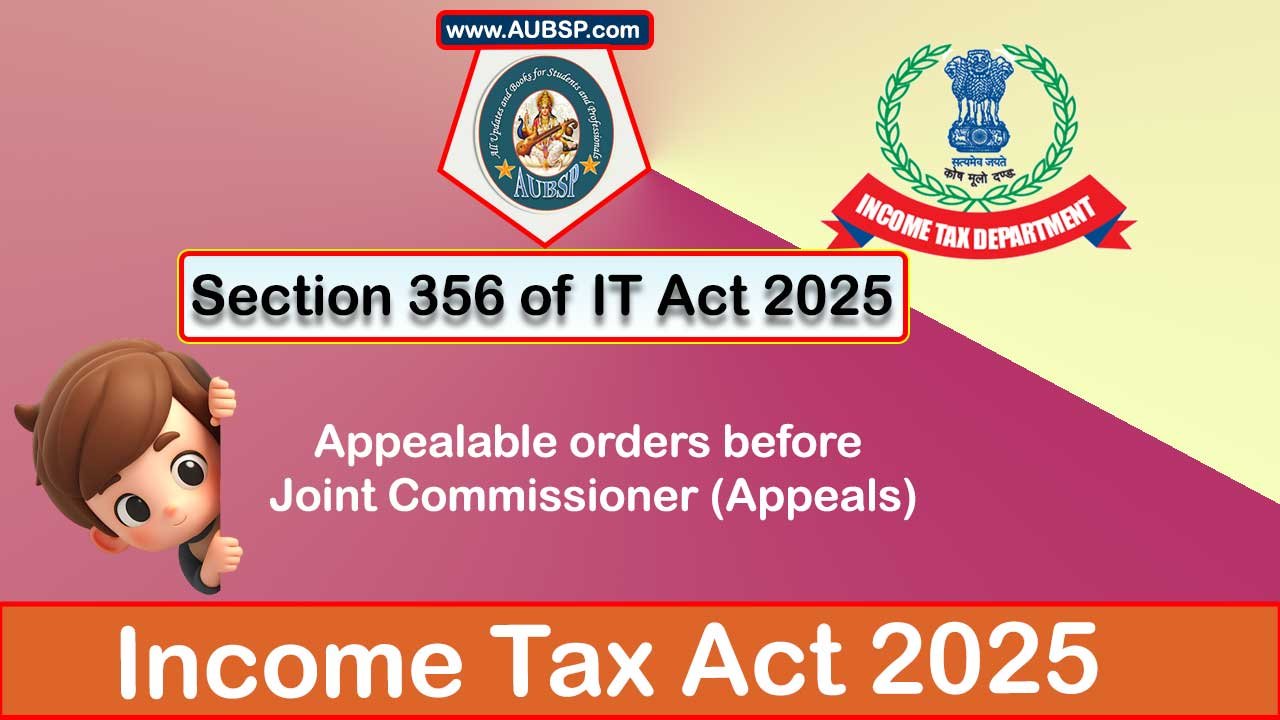Appealable orders before Joint Commissioner (Appeals)
[Section-356 as per the Income Tax Act, 2025 (this Act) w.e.f. 1st April, 2026.]
Section 356(1) of Income Tax Act 2025
356(1) Any assessee, aggrieved by any of the following orders of an Assessing Officer (below the rank of Joint Commissioner) may appeal to the Joint Commissioner (Appeals) against––
- (a) an order being an intimation under section 270(1) or 399(1), where the assessee objects to the making of adjustments; or
- (b) an order under section 270(10) or 271, where the assessee objects to the amount of income assessed, or to the amount of tax determined, or to the amount of loss computed, or to the status under which he is assessed; or
- (c) an order of assessment, reassessment or recomputation under section 279; or
- (d) an order under section 398; or
- (e) an order imposing penalty under Chapter XXI; or
- (f) an order under section 287 or 288 amending any of the orders or intimations in clauses (a) to (e).
Section 356(2) of Income Tax Act 2025
356(2) No appeal shall be filed before the Joint Commissioner (Appeals) if an order referred to in sub-section (1) is passed by or with the prior approval of, an income-tax authority above the rank of Deputy Commissioner.
Section 356(3) of Income Tax Act 2025
356(3) The Board or an income-tax authority so authorised by the Board in this regard, may transfer—
- (a) any appeal filed against an order referred to in sub-section (1) and any matter arising out of or connected with such appeal, which is pending before the Commissioner (Appeals), to the Joint Commissioner (Appeals); or
- (b) any appeal which is pending before a Joint Commissioner (Appeals) and any matter arising out of or connected with such appeal and which is so pending, to the Commissioner (Appeals), regardless of anything contained in sub-sections (1) and (3)(a),
who may proceed with such appeal or matter, from the stage at which it was before it was so transferred.
Section 356(4) of Income Tax Act 2025
356(4) Where an appeal is transferred under sub-section (3), the appellant shall be given an opportunity of being reheard.
Section 356(5) of Income Tax Act 2025
356(5) For the disposal of appeal under this section, the Central Government may notify a scheme, so as to dispose of appeals in an expedient manner with transparency and accountability, by eliminating the interface between the Joint Commissioner (Appeals) and the appellant, to the extent technologically feasible and direct that any of the provisions of this Act relating to jurisdiction and procedure for disposal of such appeals, shall not apply or shall apply with exceptions, modifications and adaptations.
Section 356(6) of Income Tax Act 2025
356(6) The Board may specify that any provisions of this section shall not apply to any case or class of cases.
Section 356(7) of Income Tax Act 2025
356(7) In this section, “status” means the category of person as defined in section 2(77) under which the assessee is assessed.
FAQs on Section 356 of Income Tax Act 2025
Who can file an appeal before the Joint Commissioner (Appeals)?
Any assessee aggrieved by specific orders of an Assessing Officer below the rank of Joint Commissioner can file an appeal.
What types of orders are appealable before the Joint Commissioner (Appeals) under Section 356(1)?
Orders include:
- Intimations under section 270(1) or 399(1) where adjustments are objected to
- Orders under section 270(10) or 271 regarding income assessed, tax determined, loss computed, or status assessed
- Assessment, reassessment or recomputation orders under section 279
- Orders under section 398
- Penalty orders under Chapter XXI
- Amendment orders under section 287 or 288 related to the above
Can an assessee appeal to the Joint Commissioner (Appeals) against an order passed with approval from a higher authority?
No, appeals cannot be made if the order was passed by or with prior approval of an authority above the rank of Deputy Commissioner, as per Section 356(2).
Is it possible to transfer an appeal between the Commissioner (Appeals) and the Joint Commissioner (Appeals)?
Yes, under Section 356(3), the Board or an authorised authority may transfer such appeals or related matters in either direction between the Commissioner (Appeals) and the Joint Commissioner (Appeals).
What happens to the appeal when it is transferred between authorities?
The receiving authority continues the appeal from the stage it was at when transferred and must provide the appellant an opportunity of being reheard under Section 356(4).
Can the Central Government notify a scheme for disposal of appeals under this section?
Yes, under Section 356(5), the Central Government may notify a scheme to ensure transparent, accountable, and technologically efficient disposal of appeals, with necessary modifications to jurisdiction and procedures.
Can any part of Section 356 be made inapplicable?
Yes, under Section 356(6), the Board may specify that some or all provisions of this section shall not apply to certain cases or classes of cases.
What does “status” mean in the context of Section 356?
“Status” refers to the category of person as defined in section 2(77) under which the assessee is assessed.
Are penalty orders appealable before the Joint Commissioner (Appeals)?
Yes, orders imposing penalties under Chapter XXI are specifically listed as appealable under Section 356(1)(e).
Are amendment orders also appealable?
Yes, if the amendment order under section 287 or 288 pertains to the types of orders listed in clauses (a) to (e), it is appealable.
What if the assessee disagrees with adjustments in an intimation under section 270(1) or 399(1)?
The assessee may appeal to the Joint Commissioner (Appeals) against such intimation under clause (a) of Section 356(1).


